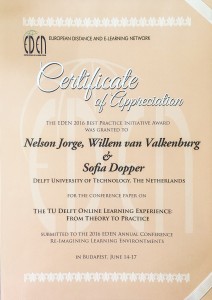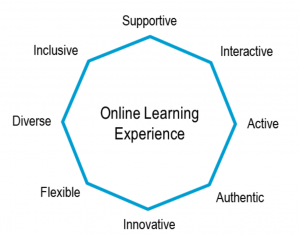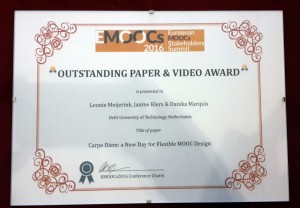Posts tagged conference paper
Enhancing quality assurance in continuing education through an organisational cultural change
Article written by Clelia Paraluppi, Patricia Mancebo May, Ceyrine Pellikaan and Naomi Wahls and published in the European Journal of University Lifelong Learning (EJULL) as part of the EUCEN Conference 2023.
Abstract
The TU Delft Extension School for Continuing Education underwent a collaborative process
to strengthen its quality culture involving professionals and leaders working on designing,
developing and delivering its online courses. In this paper we describe the steps taken
towards an enhanced Quality Assurance (QA) system. A key part of the Extension School’s
strategy to guarantee excellence in its online courses is the continuous training provided for
instructors and teaching assistants who form the course teams. This is delivered in several
ways: specialised hands-on courses and dedicated portals, personal guidance throughout
the entire course development process, and an extensive offer of short trainings. This
approach contributes both to higher quality for our online courses and to the professional
development of our teaching staff, who bring their newly acquired experience and online
materials back to their in-campus courses. In this paper, we share the lessons learned on
establishing an organisational quality culture, defining QA standards and processes, and we
showcase how the professionalisation of instructors plays a pivotal role in offering high-quality education.
Keywords
Quality assurance, quality culture, continuing education, professional development, course development
Reference
Paraluppi, C., Mancebo May, P., Pellikaan, C. & Wahls, N. (2023) ENHANCING QUALITY ASSURANCE IN CONTINUING EDUCATION THROUGH AN ORGANISATIONAL CULTURAL CHANGE. European
Journal of University Lifelong Learning, 7(2), pp. 89-96. © eucen, 2023.
https://doi.org/10.53807/0702ADf6
Download
License
This is an Open Access article, distributed under the terms of the Creative Commons Attribution 4.0 International licence (https://creativecommons.org/licenses/by-nc-sa/4.0/), which permits reusers to distribute, remix, adapt, and build upon the material in any medium or format, so long as attribution is given to the creator, the purposes are non-commercial and distribution of remixed, adapted or build upon material should be released under the same license.
Using Social Network Analysis to explore Learning networks in MOOCs discussion forums
Article written by Ali Soleymani, Laure Itard, Maarten de Laat, Manuel Valle Torre, and Marcus Specht and published in the Proceedings of the CLIMA 2022 Conference.
Abstract
Learning and educational challenges in the field of indoor climate and building services like energy systems are mainly due to the transformation of professional practices and learning networks, a big shift in the way in which people work, communicate, and share their knowledge and the need for additional workforce, either juniors or coming from other disciplines. One of the most important factors that highly influence professional development and workplace learning is networked learning. Our goal in this study, is understanding the learning networks characteristics and patterns of interaction using Social Network Analysis techniques in three MOOCs discussion forums. The result of this study shows not only the importance of Learning networks and peer support on professionalization of learners, but also how pedagogical approach of instructors in MOOCs can foster learning networks. This novel approach in developing learning networks and communities is not only able to help connect young professionals and experienced practitioners digitally, but also it can promote professional development and innovation in the energy installation sector.
Keywords
Professional learning networks, social network analysis, lifelong learning, Massive Online Open Courses
Reference
Soleymani, A., Itard, L., de Laat, M., Valle Torre, M., & Specht, M. (2022). USING SOCIAL NETWORK ANALYSIS TO EXPLORE LEARNING NETWORKS IN MOOCS DISCUSSION FORUMS. CLIMA 2022 Conference. https://doi.org/10.34641/clima.2022.300
Download
License
This is an Open Access article, distributed under the terms of the Creative Commons Attribution 4.0 International licence (https://creativecommons.org/licenses/by/4.0/), which permits reusers to distribute, remix, adapt, and build upon the material in any medium or format, so long as attribution is given to the creator. The license allows for commercial use.
The effect of the COVID-19 pandemic on a MOOC in Aerospace Structures and Materials
Article written by Ioana Jivet and Gillian N. Saunders-Smits and published in the Proceedings of the SEFI 49th Annual Conference.
Abstract
In March 2020 COVID-19 brought the world and with that aviation to a standstill. Also in March 2020, the third run of the DelftX MOOC Introduction to Aerospace Structures and Materials started on edX. This MOOC generally attracts a mixture of young aviation enthusiasts (often students) and aviation professionals. Given the large interest MOOCs have received as the pandemic hit, we investigate how the new global context affected the motivation and the way learners interact with our course material. For this project, we will use learning analytics approaches to analyse the log data available from the edX platform and the data from pre- and post-course evaluations of two runs of the same MOOC (2019 and 2020). With the insights gathered through this analysis, we wish to better understand our learners and adjust the learning design of the course to better suit their needs. Our paper will present the first insights of this analysis.
Keywords
MOOC, Aerospace Engineering, Learning Analytics, Lifelong Learning
Reference
Jivet, I., & Saunders-Smits, G. (2021). THE EFFECT OF THE COVID-19 PANDAMIC ON A MOOC IN AEROSPACE STRUCTURES AND MATERIALS. In H-U. Heiß, H-M. Järvinen, A. Mayer, & A. Schulz (Eds.), Blended Learning in Engineering Education: challenging, enlightening – and lasting? (pp. 258-267)
Download
Presentation
Presentation of the work of dr. ir. I. Jivet and dr.ir. Gillian N. Saunders-Smits at the 49th Annual SEFI conference held online from 13-16 September 2021 hosted by TU Berlin:
Teaching Software Engineering Principles to K-12 Students: A MOOC on Scratch
This paper is accepted for Software Engineering Education and Training @ 39th International Conference on Software Engineering (SEET-ICSE 2017) in Buenos Aires in May 2017.
Abstract
In the last few years, many books, online puzzles, apps and games have been created to teach young children programming. However, most of these do not introduce children to broader concepts from software engineering, such as debugging and code quality issues like smells, duplication, refactoring and naming. To address this, we designed and ran an online introductory Scratch programming course in which we teach elementary programming concepts and software engineering concepts simultaneously. In total 2,220 children actively participated in our course in June and July 2016, most of which (73%) between the ages of 7 and 11. In this paper we describe our course design and analyze the resulting data. More specifically, we investigate whether 1) students find programming concepts more difficult than software engineering concepts, 2) there are age-related differences in their performance and 3) we can predict successful course completion. Our results show that there is no difference in students’ scores between the programming concepts and the software engineering concepts, suggesting that it is indeed possible to teach these concepts to this age group. We also find that students over 12 years of age perform significantly better in
questions related to operators and procedures. Finally, we identify the factors from the students’ profile and their behaviour in the first week of the course that can be used to predict its successful completion.
Keywords
Programming education, MOOC, Scratch, code, smells, dropout prediction
Reference
Felienne Hermans, Efthimia Aivaloglou (2017) Teaching Software Engineering Principles to K-12 Students: A MOOC on Scratch. TUD-SERG-2017-003. ISSN 1872-5392
Download
Augmented Learning Environment for wound care simulation
Paper presented at the EDEN Annual Global Meeting 2016 in Budapest, Hungary from 15-17 June 2016.
Introduction
Emerging technologies for teaching and learning have made it possible to create environments, scenarios and virtual patients that simulate clinical practices in order to promote the development of skills and knowledge in healthcare education (Lewis et al., 2005; Hogan, Sabri, & Kapralos, 2007). These simulations are seen as educational techniques that bring interactivity and immersion into the learning process, allowing the recreation of clinical experiences without the risk of causing harm to patients (Maran & Glavin, 2003). Other known advantage is the possibility learners have to practice an unlimited number of times a procedure or technique until correct realization, before applying it in real-world scenarios (Rey et al., 2006).
Virtual reality (VR) and Augmented reality (AR) are examples of emerging technologies for teaching and learning that allow the creation of digitally enhanced learning environments. These technologies are expected to have an impact in education, as highlighted by the Horizon report for Higher Education in 2010, 2011, and most recently in 2016 (Johnson et al., 2010, 2011, 2016). Regarding healthcare education, several studies indicate the positive effect of AR and VR in developing decision making skills and practical procedures using virtual simulators, with a higher impact on non-experienced participants (Zhu et al., 2014).
However, using VR in healthcare education can be a debatable approach since it immerses learners in a synthetic environment, enabling them to see the surrounding real-world. Acting in a different environment from which learners will have to act in real life scenarios is another concern to take into account.
Reference
Jorge, Nelson; Morgado, Lina; Gaspar, Pedro (2016). Augmented Learning Environment for wound care simulation in Teixeira, Szucs and Mazar (2016). Conference Proceedings EDEN 2016 Annual Conference. Page 256- 264. ISBN 978-615-5511-10-3. License CC-BY 4.0.
Download
The TU Delft Online Learning Experience: From Theory to Practice
 Paper presented at the EDEN Annual Global Meeting 2016 in Budapest, Hungary from 15-17 June 2016. At the conference Gala Dinner the paper received the EDEN 2016 Best Practice Initiative Award.
Paper presented at the EDEN Annual Global Meeting 2016 in Budapest, Hungary from 15-17 June 2016. At the conference Gala Dinner the paper received the EDEN 2016 Best Practice Initiative Award.
Introduction
In 2014 TU Delft started an innovation programme to educate the world and improve quality of education based on online learning. The programme included open (OpenCourseWare and MOOCs) and online (Professional Education, Bachelor and Master) courses. Lecturers of TU Delft have shared their knowledge in MOOCs with more than 750,000 learners around the world. Next to the open courses, more than 800 learners enrolled in our online courses. Adopting new instructional strategies based on online learning elements has had a very positive impact in TU Delft’s overall education, benefiting traditional on campus education and contributing to the changing need in educating engineers (Kamp, 2014). Naturally, blended learning has arisen on campus, where online learning materials are reused in a flipped classroom approach with very positive results: higher completion rates, higher average grade, more flexibility for students to interact with the course material and more flexibility for teachers in choosing which elements to include in the interactive classroom sessions (van Valkenburg, 2015).
The development of TU Delft online courses is based on the Online Learning Experience (OLE), a pedagogical model that supports the development of our courses and strives for increasing quality. The creation of the OLE was an important step for TU Delft, contributing to the development of online courses in a more systematic and consistent way, guiding all course development teams through the realisation of several shared educational principles.
Last year, when we presented the OLE at the 2015 EDEN Conference in Barcelona, we were still at an early stage of its development, collecting fundamental background to support it and feedback from online learning experts. Although we only had a collection of ideas translated into 8 principles, it was clear that the model needed to be flexible in order to accommodate many educational scenarios that coexist among TU Delft’s Faculties, but with a clear and useful purpose to help improve the quality of our online education (Jorge, Dopper & van Valkenburg, 2015). This paper describes how the OLE is applied in practice.The main goal of the OLE is to improve the quality of our online education by setting course design and development principles to support course teams. At the same time, the OLE can be used as a tool to promote reflection before the course starts to set expectations, and in the end to evaluate and plan improvements for the next run. In the next sections we’ll describe the OLE in both ways – as course design principles (guidelines) and as a tool (the radar graph).
Reference
Jorge, Nelson; Van Valkenburg, Willem; Dopper, Sofia (2016). The TU Delft Online Learning Experience: From Theory to Practice in Teixeira, Szucs and Mazar (2016). Conference Proceedings EDEN 2016 Annual Conference. ISBN 978-615-5511-10-3. License CC-BY 4.0
Download
- Download Paper (PDF)
- Explaining the model (PDF)
- Prezi slides
video of teacher’s perspective of Online Learning Experience:
Learning Transfer: Does It Take Place in MOOCs? An Investigation into the Uptake of Functional Programming in Practice
Paper presented at the Learning @ Scale 2016 conference in Edinburgh.
Abstract
The rising number of Massive Open Online Courses (MOOCs) enable people to advance their knowledge and competencies in a wide range of fields. Learning though is only the first step, the transfer of the taught concepts into practice is equally important and often neglected in the investigation of MOOCs. In this paper, we consider the specific case of FP101x (a functional programming MOOC on edX) and the extent to which learners alter their programming behaviour after having taken the course. We are able to link about one third of all FP101x learners to GitHub, the most popular social coding platform to date and contribute a first exploratory analysis of learner behaviour beyond the MOOC platform. A detailed longitudinal analysis of GitHub log traces reveals that (i) more than 8% of engaged learners transfer, and that (ii) most existing transfer learning findings from the classroom setting are indeed applicable in the MOOC setting as well.
Reference
Guanliang Chen, Dan Davis, Claudia Hauff, and Geert-Jan Houben. 2016. Learning Transfer: Does It Take Place in MOOCs? An Investigation into the Uptake of Functional Programming in Practice. In Proceedings of the Third (2016) ACM Conference on Learning @ Scale (L@S ’16). ACM, New York, NY, USA, 409-418. DOI=http://dx.doi.org/10.1145/2876034.2876035
Paper
EMOOCS2016: Guidelines for Evaluating the Teaching and Learning in MOOCs: a TU Delft approach
Paper presented at the EMOOCS 2016 conference in Graz, Austria.
Abstract
What does it mean to qualify as a ‘successful’ MOOC? This question haunts policy makers and educators alike, and is at the core of the continued development and funding for Massive Open Online Courses. Because MOOCs can serve many purposes, their value lies in more than just their short-term educational role. A ‘successful’ MOOC can do more than just teach; it can provide institutional brand recognition, address global challenges, improve the quality of campus education, and generate data for educational research. In this paper, we examine the
methods and tools TU Delft uses to evaluate the teaching and learning within its own MOOCs in particular. Recommendations are provided for the use of a set of qualitatitve tools in addition to the more common quantitative tools used to evaluate the ‘success’ of a MOOC.
Reference
Marquis, Danika; Kiers, Janine; Meijerink, Leonie (2016). Guidelines for Evaluating the Teaching and Learning in MOOCs: a TU Delft approach. In Proceedings of the EUROPEAN STAKEHOLDER SUMMIT on experiences and best practices in and around MOOCs (EMOOCS 2016). http://emoocs2016.eu/wp-content/uploads/2016/02/proceedings-emoocs2016.pdf. ISBN 9783739237107 (page 447-459)
Slides
Paper
Paper is part of the conference proceedings (page 447-459)
EMOOCS2016: Carpe Diem: a new day for flexible MOOC design
Paper presented at the EMOOCs 2016 conference in Graz, Austria. The paper was awarded the outstanding paper & video award.
Abstract
Is there one approach to course design that can be recommended in engineering education? At Delft University of Technology (TU Delft), we designed and developed 25 MOOCs, and our experience and expertise in course design is advancing.
One of the frequently used approaches for supporting course teams was inspired by the Carpe Diem approach (Salmon 2014). This paper discusses the experience of TU Delft in implementing this methodology in an engineering setting in MOOCs. The reason for choosing the Carpe Diem approach is that it is simple to use, supports constructive alignment and is a team based approach. In the approach a more activity-based design of MOOCs is promoted through developing e-tivities. In this article the experiences of e-learning developers are described in supporting ten course teams (5 online courses and 5 MOOCs) using the Carpe Diem approach. Two main challenges in supporting course teams are highlighted;
I. How to introduce course teams to the value of the methodology and
II. How to ensure that the specific characteristics of a MOOC are embedded in the design.
For both challenges a range of ‘proposed solutions’ is suggested based on the experiences of the e-learning developers. This results in lessons learned that can be applied by anyone who would like to make use of the Carpe Diem approach for flexible MOOC design. This paper argues that the Carpe Diem approach needs to be used in an interactive and flexible way, taking into account the diversity of the course teams and course leaders as well as the special characteristics of a MOOC.
Reference
Meijerink, Leonie; Kiers, Janine; Marquis, Danika (2016). Carpe Diem: a new day for flexible MOOC design. In Proceedings of the EUROPEAN STAKEHOLDER SUMMIT on experiences and best practices in and around MOOCs (EMOOCS 2016). http://emoocs2016.eu/wp-content/uploads/2016/02/proceedings-emoocs2016.pdf. ISBN 9783739237107 (page 425-438)
Video
Slides
Paper
Paper is part of the conference proceedings (page 425-438)
Defining a Pedagogical Model: The TU Delft Online Learning Experience
 This paper was presented at the EDEN 2015 conference in Barcelona from 9-12 June 2015 by Nelson Jorge, Sofia Dopper and Willem van Valkenburg.
This paper was presented at the EDEN 2015 conference in Barcelona from 9-12 June 2015 by Nelson Jorge, Sofia Dopper and Willem van Valkenburg.
Abstract
In early 2014, the Delft University of Technology (TU Delft) started an innovation program with the aim to respond even more effectively to recent developments in open and online education. Drawing on the fields of Distance Education research and the university’s vision of the “engineer of the future”, TU Delft’s Extension School created a unified pedagogical model – the Online Learning Experience (OLE) – contributing to greater consistency in the development of online courses. Continue reading

